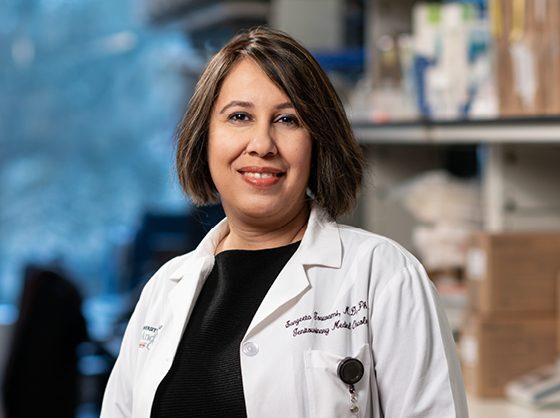Meleah Foreman celebrated her 70th birthday this past year full of gratitude and hope.
“This can sound crazy for cancer, but it’s been a pleasant journey. I think it’s just that safeness and trust that we have with MD Anderson.”
Meleah found out she had plasmacytoid bladder cancer in August 2019 after several urinary tract infections (UTIs). The diagnosis was a shock. Her family had recently mourned the death of both her parents, and Meleah’s diagnosis made her face her own mortality.
“My mother died three years before that, but she only lived five weeks after being diagnosed with stage IV squamous cell carcinoma. And, because the cancer was so far gone, they had no idea where it had started,” says Meleah.
She knew there was no time to waste and immediately thought of MD Anderson.
Aggressive bladder cancer treatment
Meleah spent over a decade teaching elementary school in a suburb north of Houston. She’d planned to continue teaching for a few more years, but her diagnosis sent her into early retirement. While she was sad to leave her third-grade class, she decided it was time to focus on her treatment.
“I felt like I couldn’t go back then. I was having problems with having to go to the bathroom a lot, and I was struggling emotionally. I just wanted to go to MD Anderson.” says Meleah.
In September 2019, she began treatment at MD Anderson with Sangeeta Goswami, M.D., Ph.D. The cancer was still at a resectable stage, meaning it could be removed with surgery. Therefore, Goswami recommended a cystectomy to remove her bladder and her pelvic lymph nodes. Before she had surgery, Meleah underwent six cycles of chemotherapy to shrink the cancer. She experienced common side effects like nausea and fatigue but stayed on track to have surgery in January 2020.
During the four-hour surgery, Louis Pisters, M.D., removed Meleah’s bladder and reconstructed the urinary tract by rerouting the way in which urine can exit the body safely. She was hospitalized for two weeks and returned home on Feb. 7, 2020. She had no complications and took about two months to fully recover. Meleah was hopeful that the cancer had been removed.
Bladder cancer spreads to other parts of the body
Meleah kept up with her labs and scans every three months after completing treatment. Her insight into the disease made her wary when something new appeared on her scalp. In October 2020, she told Goswami she had developed a bump there.
A biopsy confirmed that bladder cancer cells had spread to her scalp, pelvis, ribs and femur, which made her cancer stage IV.
Goswami immediately performed next-generation sequencing on the biopsy sample. She wanted to better understand what other abnormalities existed in Meleah’s tumor to develop a personalized treatment approach. The next-generation sequencing technology is used for DNA and RNA to detect different variants or mutations. The results showed a mutation in the ARID1a gene, which is present in around 25% of stage IV bladder cancer cases.
Immunotherapy provides hope
Goswami’s research has shown that cancers with ARID1a mutations respond better to immunotherapy.
Based on this research, Goswami recommended that Meleah receive the immunotherapy drug pembrolizumab. Meleah agreed. She stayed hopeful and prepared for the new challenge ahead.
Meleah has experienced rashes, muscle aches and joint pain from treatment, but she manages these side effects with medication. She still finds the energy to spend time with her husband and family.
Embracing life after bladder cancer
Meleah’s most recent scans showed no evidence of disease. She is optimistic and grateful that genetic sequencing allowed Goswami to find a better way to treat the bladder cancer when it spread.
“For Dr. Goswami, it’s something that she not only sees patients and treats cancer; she’s also trying to discover new ways of treating cancer. I definitely feel safer knowing that she’s not only my doctor; she’s also a scientist. She is like family to me.” says Meleah
Goswami takes her work caring for and advancing treatments for patients like Meleah seriously.
“It’s a privilege to take care of them, then learn from them and utilize our research in designing the treatment algorithm. I see us hopefully treating bladder cancer as a chronic disease one day.” says Goswami.
Thanks to the immunotherapy she is receiving now, Meleah is looking forward to many other milestones in her life. Although she envisioned a completely different retirement, she is grateful to have more time with her loved ones.
“I have a wonderful life with my husband; I still set goals, I want to see my granddaughter graduate from college next May, then go home for Christmas and be here with my husband. I feel like I have so much to live for.” she said.



